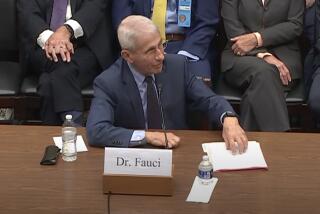<i> Contra</i> speak : In a Word, Surprisingly Few Terms of Endearment
- Share via
They’re angry. They’re disappointed. They’re glum.
Lt. Col. Oliver North and all the other players in the Iran- contra scandal have let them down.
But they’re not simply upset about possible obstruction of justice or potential violations of the Constitution. These experts and observers are concerned about language. They’re worried about contra speak--the mixed bag of euphemisms, code words, cliches, malapropisms, bureaucratic jargon, hair-splittings, acronyms, retreads from the political past and a few--the experts say very few--new gems of speech that have emerged from the Byzantine coils of this ocean-spanning affair.
As a source of rich metaphors, memorable phrases and high-flying rhetoric, the Iran- contra scandal apparently ranks a distant second to Watergate, the Nixon-era crisis that added to the language stonewall, modified limited hangout, twisting slowly in the wind, smoking gun, cover-up and the big enchilada, to name a few.
So far, the major contributions of this latest national controversy appear to be variations on shred and shredder-- as in shredding party-- and phrases like an American hero, management style, Country 1, Country 2 and plausible deniability.
Hard to Define
In fact, this is one case of political skulduggery that has had trouble finding a name. Unlike Watergate, a set of related intrigues whose elements were crystallized by a burglary at a luxury apartment-office complex, the Iran- contra imbroglio benefits from no such specific event or place.
Michael Kinsley, editor of the New Republic, said he and the magazine staff saw this shortcoming late last year and sponsored a contest to name the scandal. It attracted hundreds of entries and the magazine, known for its outspoken neo-liberal outlook, decided on Iranamuck as its choice. But, Kinsley noted, the tag “hasn’t really taken off” and the scandal is limping along with drab multiple-word monikers like “the Iran- contra affair.”
Palo Alto linguist Geoff Nunberg thinks the scandal has been too unfocused in terms of places, actions and people to produce memorable turns of phrase.
At this week’s hearings, for example, questioning of North has been divided among many more House members, senators and staff counsel than during Watergate, Nunberg, a language commentator on National Public Radio, said.
“Watergate was such a star turn for the senate committee members” who each got lots of television time and were able to make points repeatedly, he said. As a result, then-Sen. Howard Baker became famous for his question, “What did the President know and when did he know it?” Not surprisingly, the question has found a second life in the current scandal.
It’s no surprise to David Edwards, a lobbyist for the Modern Language Assn., an education organization in Washington, D.C., that the words of Watergate have also made something of a comeback now.
“Watergate was all new and as a consequence, it had meaning,” he said. “This one hasn’t been nearly as neat.”
U.S. Sen. William S. Cohen (R-Me.) has quipped that the scandal doesn’t have a smoking gun, it has a “smoking shredder.”
Shred, seemingly the only active verb spawned by the scandal, owes its relative popularity in everyday speech and headlines to the time spent by North and his secretary, Fawn Hall, destroying a large stack of National Security Council documents last fall. It was a graphic event in an otherwise murky and complex tangle. However, when North joked this week that “My memory has been shredded,” members of the House and Senate hearing his testimony were not greatly amused.
Shred, it turns out, belongs to a group of words beginning with the letters “shr” that, according to Nunberg, almost always “denote things that are small or nasty.” The list in the dictionary includes shrapnel, shrew, shriek and shrimp.
Edward Finegan, a USC linguistics professor, said strong, active words such as stonewall and shred are more likely to work their way into everyday use because they “can invigorate the language when they give us a tidy phrase.”
But he also warned that euphemisms--such as misled for lied or protect for cover-up-- can “inflate language and cheapen words.” The instinct for euphemism is understandable, he added. “We use a euphemism to soften the blow of a word whose pointedness can prick us,” he explained.
Nunberg added that “people make their moral peace with themselves through the language that they use.”
President Reagan’s description of North as “an American hero” is also often cited as a memorable turn of phrase that owes its currency to the scandal. The label is widely used both derisively and respectfully in discussions of North.
Early this year, when the Tower Commission’s investigation of the scandal was released, management style-- a euphemism for President Reagan’s ignorance of White House goings-on--enjoyed a brief vogue but has since faded, along with the report that gave it birth.
The testimony is larded with plenty of grammatical errors. National Security Council members apparently were never given a job to do, they were “tasked.”
The scandal has also spewed forth a confusing hodgepodge of acronyms, such as TOW for an anti-tank missile and PROFS notes for computer messages sent by staffers of the National Security Council. Then there are the code words like second channel, the name for a group of Iranians approached by the United States in the arms-for-hostages deal.
And how many people know--or care--that North developed a largely fruit-based code (apples and oranges) for the countries involved in Iran arms shipments?
North, concerned with the laugh appeal of his fondness for codes, Wednesday issued a spirited defense of his penchant.
“I realize that people snicker when they refer to the code sheet,” North, who sometimes called himself “Mr. Goode and Steelhammer,” told the congressional committees. “The reason we were using the code sheet was not some joke or some childish line from Captain Midnight. We were talking on open telephone lines.”
Ironically, North himself was tripped up by the committee’s codes Tuesday, when he inadvertently called a country by its name rather than its number, thus blowing Portugal’s cover.
Kinsley and several others noted that one inelegant and wordy phrase from Watergate-- that point in time-- is getting an encore this week. Another repeater is plausible deniability, a favorite of those who fear indictment or public embarrassment. Such bureaucratic usage is part and parcel of everyday life in a government-dominated town, Edwards said.
“I had lunch with a Pentagon official last week and we interfaced so well we almost had a symbiotic relationship,” he joked.
Some observers believe that legalistic hairsplitting over which words to use for certain scandal-related acts are having a dampening effect on the vocabularies of Iran- contra figures.
Larry Berg of USC’s Institute for Politics said the quibbling over whether to describe Iran arms sales profits as residuals or diversions may be part of a strategy by witnesses and their attorneys to bore the TV audience.
“I think there’s a lot of hairsplitting and they may be doing it to turn the public off,” he maintained.
As far as Berg is concerned, the current hearings are enough to make him yearn for the good old days. North’s defiant and carefully worded performance “makes (H. R.) Haldeman and (John) Ehrlichman look like fairly straightforward people,” he charged, referring to President Nixon’s two top aides who were combative witnesses in the Watergate hearings.
Karen Tumulty of the Times Washington bureau contributed to this report.
More to Read
Sign up for Essential California
The most important California stories and recommendations in your inbox every morning.
You may occasionally receive promotional content from the Los Angeles Times.












